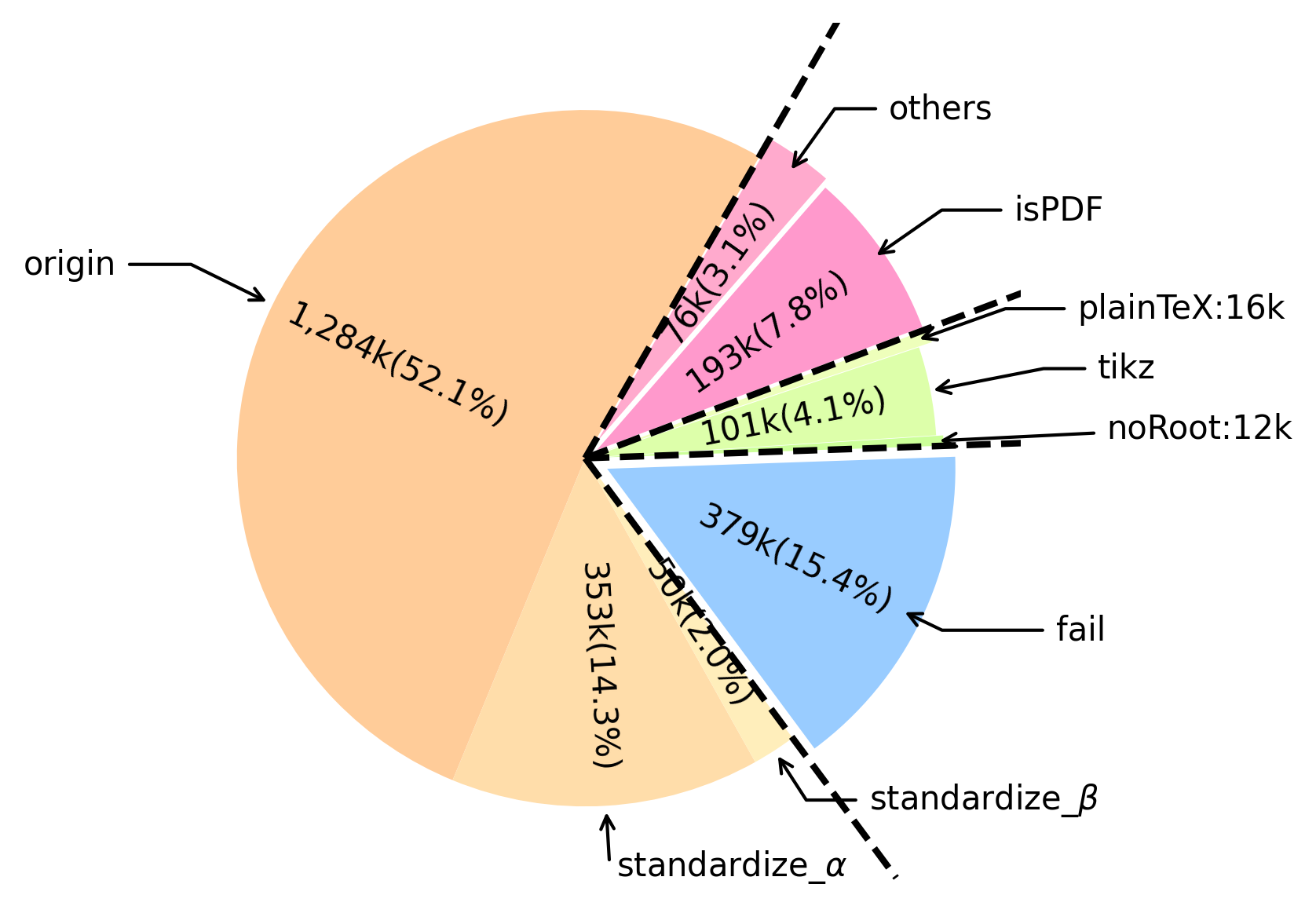|
--- |
|
license: mit |
|
task_categories: |
|
- question-answering |
|
- text2text-generation |
|
- text-generation |
|
language: |
|
- en |
|
pretty_name: uparxive |
|
size_categories: |
|
- 1M<n<10M |
|
configs: |
|
- config_name: example_data |
|
data_files: "example.json" |
|
|
|
|
|
|
|
|
|
--- |
|
# The **Uparxive** Dataset |
|
|
|
The [uparxive](https://github.com/veya2ztn/uparxive) aims to provide a llm-friendly dataest for the whole arxiv .tex source. A similiar dataset is the [unarxive](https://github.com/IllDepence/unarXive), while the uparxvie use a different tool chain. |
|
|
|
The Uparxive dataset is stored in `.json` format, which can be seamlessly converted into Markdown `.md` format. |
|
|
|
See github [repo](https://github.com/veya2ztn/uparxive) for a simple converter. |
|
|
|
### Format Rules |
|
|
|
The Uparxive dataset adheres to the following rules: |
|
|
|
- **Tables and Figures**: Elements enclosed within `\begin{table} \end{table}` and `\begin{figure} \end{figure}` tags are extracted and appended at the end of the document for clarity and organization. |
|
|
|
- **Citations and References**: Citations (`\cite{}`) and references (`\ref{}`) are converted to more explicit forms to improve readability. Examples include: |
|
- Direct mentions: `(See [Ref. [1,2] of ArXiv.1512.03385])` |
|
- Contextual references: `in [Ref. [1,2] of ArXiv.1512.03385]` |
|
- Equation/Section/Figures/Tables references: `in [Equation [1] of ArXiv.1512.03385]`, depending on the usage context. |
|
|
|
- **Mathematical Notations**: |
|
- **In-line Math**: Single dollar signs `$` are used for in-line mathematical expressions, e.g., `$\alpha$`. |
|
- **Block Math**: Double dollar signs `$$` denote block mathematical expressions, e.g., `$$\mathbf{y}=\mathcal{F}(\mathbf{x},\{W_{i}\})+\mathbf{x}.$$` |
|
|
|
> See [1512.03385.json](https://github.com/veya2ztn/uparxive/blob/release/example/1512/1512.03385/uparxive/1512.03385.json) and [1512.03385.md](https://github.com/veya2ztn/uparxive/blob/release/example/1512/1512.03385/uparxive/1512.03385.md) as example |
|
|
|
|
|
### Dataset Sources [optional] |
|
|
|
To construct the complete Uparxive dataset from scratch, please refer to the GitHub [repo](https://github.com/veya2ztn/uparxive). |
|
|
|
> Note: The "full" version of uparxive was generated from all of *arXiv.org* including non-permissively licensed papers. Make sure that your use of the data is compliant with the paper's licensing terms. (For information on papers' licenses use [arXiv's bulk metadata access](https://info.arxiv.org/help/bulk_data/index.html)). |
|
|
|
> Note: paper under [CC BY-NC-ND](http://creativecommons.org/licenses/by-nc-nd/4.0) license are not included in the dataset. |
|
[More Information Needed] |
|
|
|
#### Who are the source data producers? |
|
- **arXiv Bulk Data Access**: Access and download bulk data directly from arXiv using the AWS S3 `request-payer` dataset. Detailed instructions and access points can be found here: [arXiv Bulk Data Access](https://info.arxiv.org/help/bulk_data.html). |
|
- **arXiv API**: For more specific data needs or metadata, use the arXiv API. Documentation and usage guidelines are available here: [arXiv API](https://info.arxiv.org/help/api/index.html). |
|
- **Important Note**: When crawling arXiv source files, ensure to use `export.arxiv.org` instead of the official `arxiv.org` domain to avoid overloading the main site. |
|
|
|
[More Information Needed] |
|
|
|
# Statistic |
|
This dataset part will need 156G dick space for 1.7M papers. |
|
|
|
Up to April 2024, there are around 2,450,893 papers in the arxiv source, and the uparxive dataset has covered 1,700,000 papers. Those missing parts are mainly due to the lack of the `.tex` source or the failure of the conversion process. |
|
 |
|
|
|
|